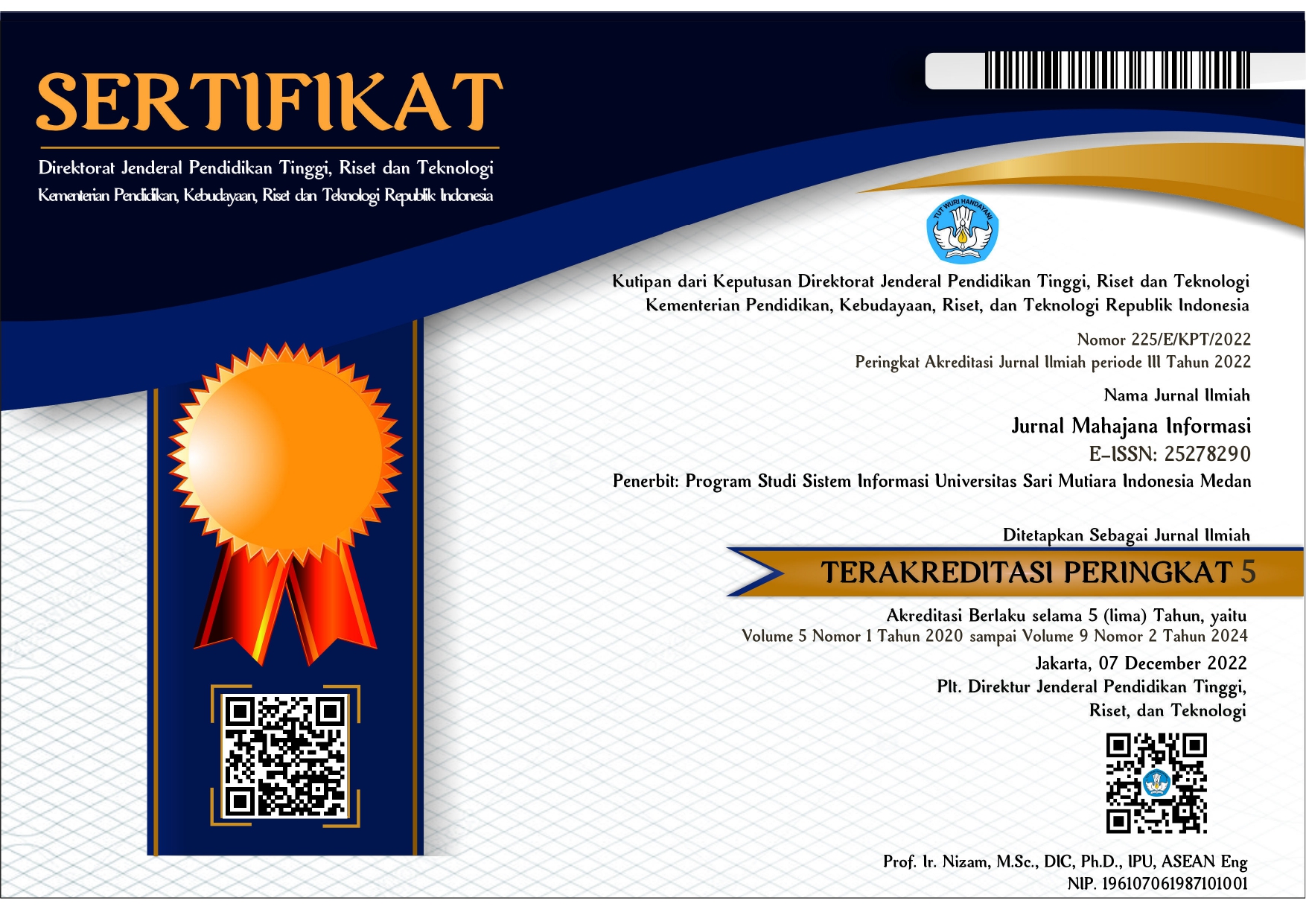Implementasi Algoritma Penjadwalan Multilevel Feedback Queue pada Aplikasi Berbasis Flutter
DOI:
https://doi.org/10.51544/jurnalmi.v8i2.4643Keywords:
Algoritma Penjadwalan, Multilevel Feedback Queue, Dart, FlutterAbstract
Application development has experienced a shift towards a cross-platform approach, where developers can write code once for multiple platforms. Flutter, as a fast-growing cross-platform framework with a wide community is one of the most popular cross-platform frameworks today. However, along with that, there is an increase in application complexity which makes the concept of multitasking very important. This article proposes the implementation of the Multilevel Feedback Queue (MLQ) scheduling algorithm in Flutter applications, which can help manage tasks and improve application efficiency. This research aims to examine the changes in application efficiency after the implementation of MLQ, as well as examine whether the changes remain relevant on different operating systems, namely Windows and Android. The implemented MLQ algorithm is an algorithm with adjustments to the calculation of time quantum and integration with the Shortest Job First (SJF) algorithm based on previous research. Tests were conducted using the Flutter benchmarking feature to measure the application frame rate before and after MLQ implementation on Windows and Android. The results of this study found that the implementation of MLQ increased application efficiency by 269% on the Windows operating system and 155% on the Android operating system.
Downloads
References
Biørn-Hansen A, Rieger C, Grønli T-M, Majchrzak TA, Ghinea G. An empirical investigation of performance overhead in cross-platform mobile development frameworks. Empir Softw Eng. 2020 Jul 9;25(4):2997–3040.
AL-atraqchi OMA. A Proposed Model for Build a Secure Restful API to Connect between Server Side and Mobile Application Using Laravel Framework with Flutter Toolkits. Cihan Univ Sci J. 2022 Aug 20;6(2):28–35.
mohammed ahmed O. Backend as a Service Cloud Computing Integrated with Cross-platform Mobile Development Framework to Create an E-learning application that works in Mobile and Web with a single codebase. In: 4th International Conference on Communication Engineering and Computer Science (CIC-COCOS’2022). Cihan University; 2022. p. 50–7.
Setiawan A, Sebastian D, Adi Nugraha K. Implementasi Fitur Sinkronisasi Basis Data Pada Aplikasi Monitoring Keuangan Pada Wilayah Dengan Keterbatasan Jaringan Internet. J Terap Teknol Inf. 2022 Apr 30;6(1):63–74.
Adler RF, Benbunan-Fich R. The Effects of Task Difficulty and Multitasking on Performance. Interact Comput. 2015 Jul;27(4):430–9.
Becchetti L, Leonardi S. Nonclairvoyant scheduling to minimize the total flow time on single and parallel machines. J ACM. 2004 Jul;51(4):517–39.
Van Houdt B, Van Velthoven J, Blondia C. QBD Markov chains on binomial-like trees and its application to multilevel feedback queues. Ann Oper Res. 2008 Apr 29;160(1):3–18.
Thombare M, Sukhwani R, Shah P, Chaudhari S, Raundale P. Efficient implementation of Multilevel Feedback Queue Scheduling. In: 2016 International Conference on Wireless Communications, Signal Processing and Networking (WiSPNET). IEEE; 2016. p. 1950–4.
Creswell JW, Creswell JD. Research Design: Qualitative, Quantitative, and Mixed Methods Approaches. 5th ed. SAGE Publications, Inc; 2018.
Riadi S, Ulum F. ANALISIS PENERAPAN ALGORITMA FIRST COME FIRST SERVED (FCFS) DALAM PROSES PESANAN PADA APLIKASI GOJEK. J Inform dan Rekayasa Perangkat Lunak. 2021;2(2):268–75.
Verawati I, Sulistiyono M. PERANCANGAN SISTEM INFORMASI PENJADWALAN PROGRAM KERJA PENJAMINAN MUTU UNIVERSITAS AMIKOM DENGAN METODE MULTILEVEL FEEDBACK QUEUE. In 2018. Available from: https://api.semanticscholar.org/CorpusID:196157330
Brown J. On Intelligent Mitigation of Process Starvation In Multilevel Feedback Queue Scheduling. 2017 Dec;
Tjandra S, Chandra GS. Pemanfaatan Flutter dan Electron Framework pada Aplikasi Inventori dan Pengaturan Pengiriman Barang. J Inf Syst Hosp Technol. 2020 Dec 10;2(02):76–81.
Scholarworks@gvsu S, Latture AD. Backdrop: An Exploration of Flutter [Internet]. Available from: https://scholarworks.gvsu.edu/cistechlib
Malik R, Mann R, Knapman R. Rapid benchmarking: the case of a multinational dairy company. Benchmarking An Int J. 2021 Mar 29;28(3):1031–58.
Wahyudi H. Values Adoption of Benchmarking to Best Practice. In 2021.
Beretta S, Dossi A, Grove H. Methodological strategies for benchmarking accounting processes. Benchmarking Qual Manag Technol. 1998 Sep 1;5(3):165–83.
Jardosh AP, Ramachandran KN, Almeroth KC, Belding-Royer EM. Understanding Congestion in IEEE 802.11b Wireless Networks. In: Proceedings of the 5th ACM SIGCOMM Conference on Internet Measurement - IMC ’05. 2005.
Andrian Ginting Student D, Dwi Endah O. Implementation of Multilevel Feedback Queue Algorithm in Restaurant Order Food Application Development for Android and iOS Platforms. Vol. 80, International Journal of Computer Applications. 2013.
Downloads
Published
How to Cite
Issue
Section
License
Copyright (c) 2023 Fransiska Artia, I Gede Maha, M. Rakhmat Dramaga, Aqwam Rosadi Kardian

This work is licensed under a Creative Commons Attribution-ShareAlike 4.0 International License.













 This work is licensed under a
This work is licensed under a 